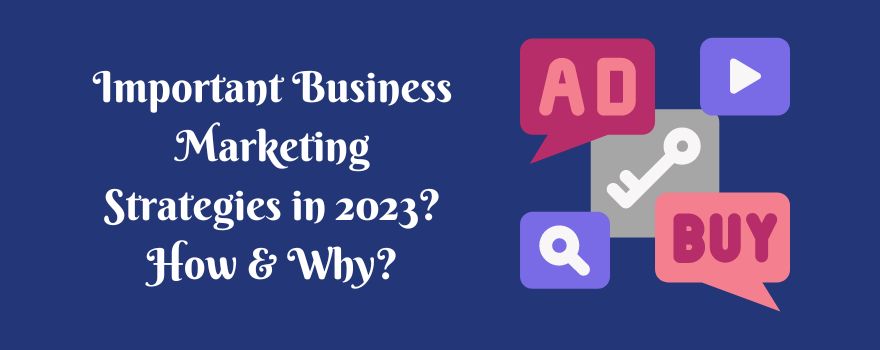Social media has become an integral part of modern society and has revolutionized the way we communicate and share information. As a result, it has also become an important tool for businesses to market their products and services. In 2023, social media will continue to be a crucial component of any effective business marketing strategy.
Here are a few reasons why social media is important for business marketing in 2023:
1. Increased Brand Awareness for Business Marketing:
Social media allows businesses to reach a wider audience and increase brand awareness. With a strong social media presence, businesses can showcase their products and services to potential customers, as well as interact with them in real-time. This can help build trust and loyalty among customers, which can ultimately lead to increased sales.
2. Targeted Advertising for Business Marketing:
Social media platforms offer advanced targeting options that allow businesses to reach specific audiences based on demographics, interests, and behaviors. This can help businesses effectively reach their target market and maximize their advertising spend.
There are many marketing strategies that can be used to increase brand awareness for a business. Some effective strategies include:
Content marketing:
Creating and sharing valuable, relevant, and consistent content can help to increase brand awareness and build trust and credibility with your audience.
Social media marketing:
Using social media platforms to promote your business and interact with your audience can help to increase brand awareness and reach a wider audience.
Influencer marketing:
Partnering with influencers in your industry can help to increase brand awareness and reach a new audience.
Video marketing:
Creating and sharing engaging and informative videos can help to increase brand awareness and capture the attention of your audience.
Paid advertising:
Using paid advertising channels, such as search engines and social media, can help to increase brand awareness and reach a targeted audience.
Collaborations and partnerships:
Working with other companies or organizations can help to increase brand awareness and reach a new audience.
Event marketing:
Promoting your business through events, such as trade shows and conferences, can help to increase brand awareness and generate leads.
By effectively implementing these strategies, you can increase brand awareness and drive traffic and sales for your business.
3. Customer Engagement for Business Marketing:
Social media allows businesses to directly engage with customers and respond to their questions, comments, and concerns in real-time. This can help build strong customer relationships and improve customer satisfaction.
There are many marketing strategies that can be used to increase customer engagement for a business. Some effective strategies include:
Personalization:
Tailoring the content, messaging, and experiences of your business to the individual needs and preferences of your customers can increase engagement and drive sales.
Interactive content:
Creating content that is designed to engage and involve the audience, such as quizzes and polls, can increase engagement and gather valuable insights about your customers.
Interactive experiences:
Creating immersive and interactive experiences, such as virtual reality or augmented reality experiences, can increase engagement and create a strong emotional connection with your customers.
Social media marketing:
Interacting with your customers and responding to their comments and messages on social media can increase engagement and build relationships with your audience.
User-generated content:
Encouraging and featuring content that is created and shared by your customers and fans can increase engagement and build trust and credibility with your audience.
Customer loyalty programs:
Offering incentives and rewards for customer loyalty can increase engagement and drive repeat business.
Email marketing:
Sending targeted and personalized emails to your customers can increase engagement and drive sales.
By effectively implementing these strategies, you can increase customer engagement and drive traffic and sales for your business.
4. Cost-effective Marketing for Business Marketing:
Social media marketing is often more cost-effective than traditional marketing methods, as it allows businesses to reach a large audience with a relatively small budget. In addition, businesses can easily track the success of their social media campaigns through analytics, which can help them optimize their marketing efforts and improve ROI.
There are many marketing strategies that can be cost-effective for a business, especially for small and medium-sized businesses with limited budgets. Some effective strategies include:
Content marketing:
Creating and sharing valuable, relevant, and consistent content can be a cost-effective way to reach and engage with your audience.
Social media marketing:
Using social media platforms to promote your business and interact with your audience can be a cost-effective way to reach a large and constantly connected audience.
Email marketing:
Sending targeted and personalized emails to your customers can be a cost-effective way to drive traffic and sales.
Influencer marketing:
Partnering with influencers in your industry can be a cost-effective way to reach a new audience and promote your business.
User-generated content:
Encouraging and featuring content that is created and shared by your customers and fans can be a cost-effective way to increase engagement and build trust and credibility with your audience.
Search engine optimization (SEO):
Optimizing your website to rank higher in search engine results can be a cost-effective way to drive organic traffic to your business.
Public relations (PR):
Managing the reputation and public image of your business through press releases and media relations can be a cost-effective way to build trust and credibility with your audience.
By effectively implementing these strategies, you can effectively market your business and reach your target audience without breaking the bank.
5. Enhanced Customer Service for Business Marketing:
Social media can also be used as a customer service platform, allowing businesses to quickly and efficiently resolve customer issues and concerns. This can help improve customer satisfaction and loyalty.
There are many marketing strategies that can be used to enhance customer service for a business. Some effective strategies include:
Personalization:
Tailoring the customer service experience to the individual needs and preferences of your customers can create a more relevant and personalized experience and increase customer satisfaction.
Social media customer service:
Using social media platforms to interact with and respond to customer inquiries and complaints can help to resolve issues quickly and build relationships with your customers.
Live chat:
Adding a live chat feature to your website or mobile app can provide customers with a convenient and immediate way to get help and support.
Self-service options:
Providing self-service options, such as online FAQs and knowledge bases, can allow customers to find answers to their questions and solve problems on their own.
Customer loyalty programs:
Offering incentives and rewards for customer loyalty can increase customer satisfaction and drive repeat business.
Customer Feedback:
Gathering and using customer feedback to improve your products and services can increase customer satisfaction and loyalty.
Employee Training:
Providing employees with training and resources to effectively handle customer inquiries and complaints can improve the overall customer service experience.
By effectively implementing these strategies, you can enhance customer service and increase customer satisfaction and loyalty for your business.
Conclusion
In conclusion, social media is an essential tool for businesses looking to effectively market their products and services in 2023. By building a strong social media presence, businesses can increase brand awareness, target specific audiences, engage with customers, and improve customer service – all at a cost-effective price.

